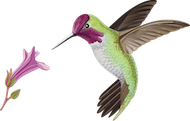How to bring conservation messaging into wildlife-based tourism
The study states that failing to encourage tourists to do more on behalf of wildlife represents a missed opportunity for conservation.
New research to address kelp forest crisis in California
California Sea Grant is pleased to announce six new research projects aimed at restoring California’s kelp forests.
Sparrows are singing a new song, in a rapid, unprecedented shift
White-throated sparrows across Canada are abandoning an old song in exchange for a trendy new tune. The reason remains a mystery.
Gnatcatcher: CWC’s patient of the week
On June 11, California Wildlife Center received a nestling blue-gray gnatcatcher that had been grabbed by a dog in Agoura Hills.
Backyard Birding 101
If you pay attention to what’s going on in your own backyard, ornithologist Viviana Ruiz Gutierrez says the birds you see will likely put on a great show.
Helpful Bugs of Northern New Mexico: How to Identify and Conserve Beneficial Insects for Pest Control
While we tend to pay attention to bugs around us when they become a nuisance, the vast majority of insects around our homes and gardens are actually beneficial, pollinating plants and keeping garden pests in check.
Nature-Based Solutions: A Win for Both Biodiversity and the Climate
Natural areas support wildlife during a time of shifting weather patterns, and they also help with carbon sequestration. Protecting and creating habitat should be an integral part of our response to climate change.
The Living Landscape: A walk in a reopened park
It was as sweet as sunshine to get out and hike the trails of Clear Lake State Park once again.
Elderberry shrubs flourish in the Anza Valley
The lowly shrub is one of the most important food sources for birds, bees and butterflies in California. It also provides dense, low cover for many small mammals, birds and bugs.
Conservationists warn Covid waste may result in ‘more masks than jellyfish’ in the sea
Beaches on the French Côte d’Azur like Cannes or St. Tropez are among the most coveted vacation spots worldwide, but now the coronavirus pandemic has left an abundance of pollutants in the water: discarded masks and gloves.

